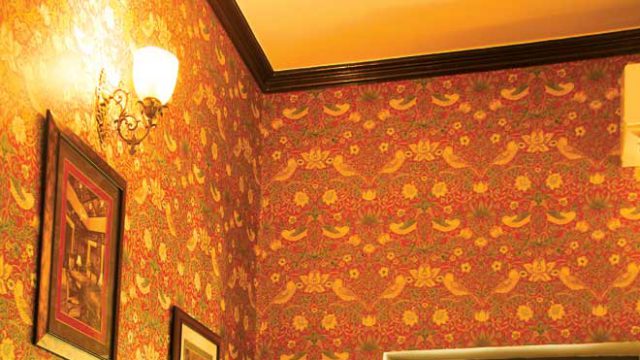It was 5.45am on a cold and foggy winter morning, and I had layered myself up one sweater at a time till I had reached a point where I could barely move my arms. Even though it was time to head out for a trip to the Dudhwa Tiger Reserve, I was reluctant to leave my cosy room at the Jaagir Lodge, where I had checked in the previous evening.
This haveli, built in the 1940s, was formerly a hunting lodge used by British Governors. It is now a heritage hotel, exuding a combination of rustic Indian and colonial flavours. The rooms have lovely antique furniture and four-poster beds complete with soft duvets and sheer white drapes. Add high thatched roofs, stone fireplaces, and teak wood dressers, and you could be transported to an era gone by. The wallpaper is gorgeous, and different in each room. An old library which doubles as a lounge with fireplace, is perfect for curling up with a book. It’s precisely the sort of place that makes you feel that travelling solo is overrated.

Kanwaljeet, partner of the just- opened Jaagir Lodge, has contributed in a large measure to the conservation of the land in this area and is doing the same in preserving this hidden gem of a property. Passionate about soft furnishings and detailing at the property, which he treats as a second home, he has sourced cutlery from Switzerland, switches from Australia and lobby chandeliers from Italy. The washrooms have been brightened up with colourful Bikaneri tiles.
Leaving my charming quarters, I picked up a ‘Dudhwa Tiger Reserve’ cap and was all set for my safari. Along the way, villagers carrying bundles of sugarcane on bicycles were a recurring scene, just like the cane fields and bare poplar trees. For about 40 minutes all I saw were sal trees on either side of the road, converging to a single vanishing point, taking me back to my perspective lessons in school
By then I was missing the four- poster bed and was about to doze off but was quickly shaken out of my reverie by two scary stray dogs who chased us almost till the entrance of the national park. A few more kilometres into the park took me closer to the one-horned rhino: rhinos were re-introduced in Dudhwa in 1984-85. While I was hoping to spot a tiger, the odds of running into a rhino were much higher. Dudhwa is a hop-skip-and-jump away from the Indo-Nepal border in Lakhimpur Kheri district and is surrounded by buffer forests to the north and south. The park, which is about five-and-a-half hours away from both Jim Corbett National Park and Binsar, is one of the last remaining sites of the terai ecosystem that supports a large diversity of flora and fauna. Migratory birds, which settle here during winter, would enchant any birder.

For someone like me who can only differentiate between a crow and a pigeon, I just know that I saw many birds. The park’s characteristic feature is that it’s not a one ‘park’ stop—it comprises of two wildlife sanctuaries, each with its own characteristic feature. Katerniaghat is known for its gharials and dolphins and Kishanpur for its elusive tigers and birds. The closest I got to the cat family, however, apart from old pugmarks, was glimpsing a wild cat.
Safaris can be tiring, and we stopped in the middle of a sugarcane farm for a hot cup of instant coffee and cookies. Jaagir Lodge makes sure that their guests are comfortable at all times. Like this planned coffee break, which was a pleasant surprise. As was the hot-water bag given to me in the morning when I groggily sat back in the open jeep. The two extra blankets to wrap my sleepy self in and to protect me from the biting early morning cold of the open forest, had been very welcome too.
It didn’t take long to get a sense of Dudhwa. It was easy—railway crossings, mustard fields, sugarcane fields, swamps, electric poles with many birds on them along with thatched houses. After the long safari and the short stops at the Nepal border (cross the border and get your Indian currency exchanged for some Nepali rupees for kicks) and the Tharu village, we were on our way back. I was dreaming of sinking into the four-poster bed in my charming den.
I was exhausted but my hosts didn’t seem to think so. Instead, I was taken for a short walk. The sun had set a while ago, so it was pitch dark. We walked on a path paved by thin poplar trees, with just a single torch to guide us. I wasn’t carrying anything to protect myself in the wild. My eyes followed the thin tree trunks up their bare branches to see a clear sky full of stars. It was a scene so magical that it made the walk totally worth it. We walked a while before I discovered that I was being taken to my second surprise of the day, a bonfire, an ‘illuminating’ end to the day.
I returned to the lodge safe and sound and sat on the charpai at the mango grove, which seamlessly merged with the jungle. It was a perfect setting to unwind gazing at the trees after having a ‘wild’ time.
Information
Location: Bikram Ban Farms, Palia Kalan, Lakhimpur Kheri, Uttar Pradesh. Dudhwa is 450km, or a nine-hour drive, from Delhi. The drive from Lucknow is about five hours.
Accommodation: 3 Luxury Rooms, 3 Luxury Suites, 6 Luxury Villas (Jhaalas)
Tariff: From Rs 11,305 approximately
Contact: +91-9602091000, www.treeofliferesorts.com




